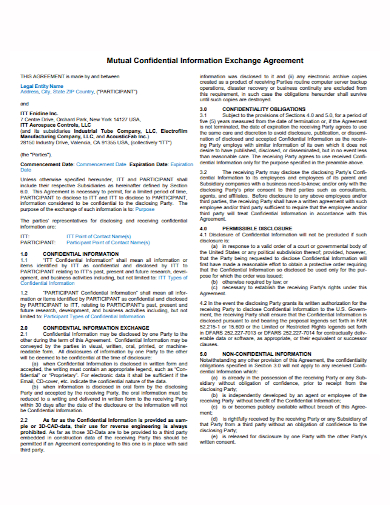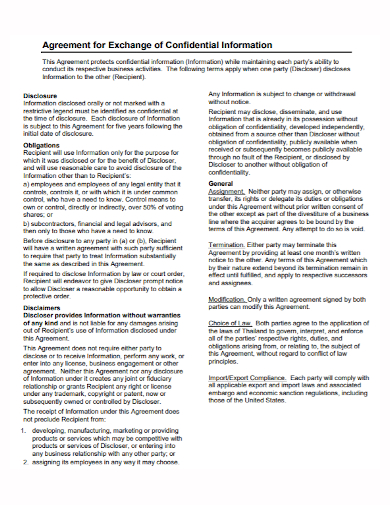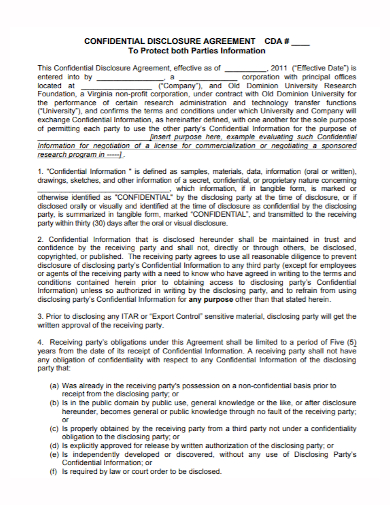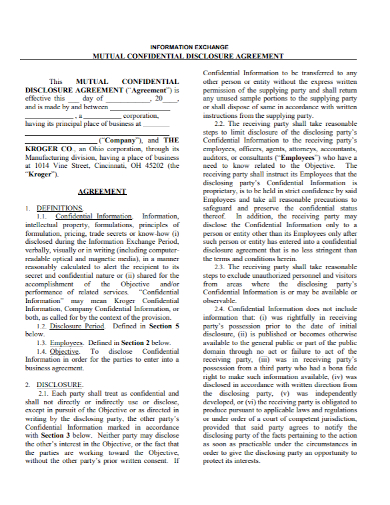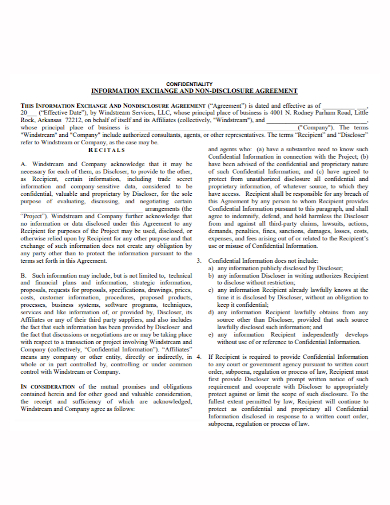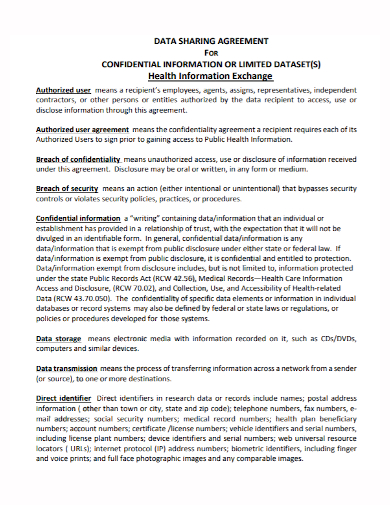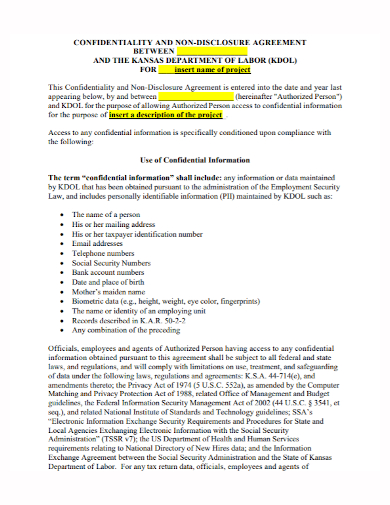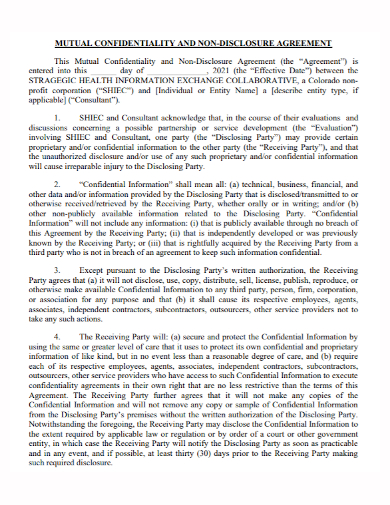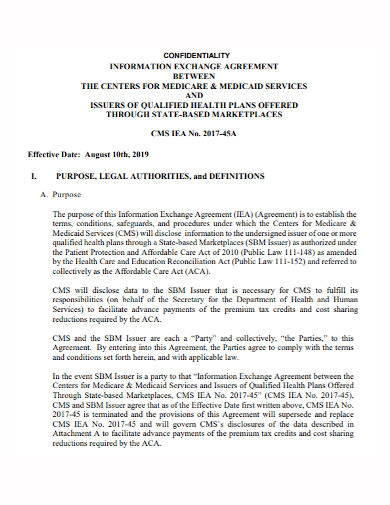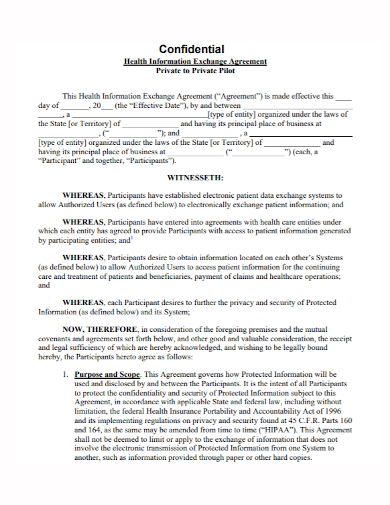10+ Confidential Information Exchange Agreement Samples
Confidentiality, or the ability to keep some information private, is vital in a variety of vocations. Confidentiality is important for legal and reputational reasons, as well as the possibility of future employment. Different industries, such as schools, corporations, and the health sector, provide a variety of functions for confidentiality. In need of some assistance with your non-disclosure agreements? We’ve go you covered! In this article, we provide you with free and ready-made samples of Confidentiality Information Exchange Agreements in PDF and DOC formats that you could use for your benefit. Keep on reading to find out more!
1. Confidential Information Exchange Agreement Template
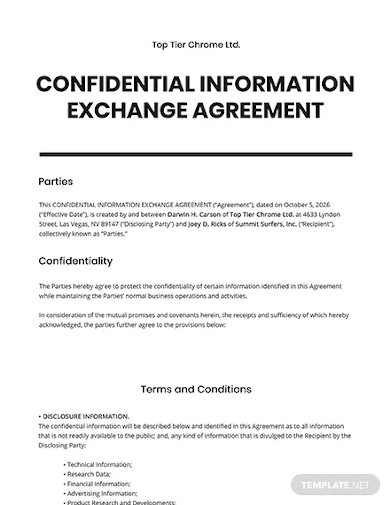
2. Mutual Confidential Information Exchange Agreement
3. Agreement for Exchange of Confidential Information
4. Confidential Information Exchange Agreement
5. Company Confidential Information Exchange Agreement
6. Sample Confidential Information Exchange Agreement
7. Confidential Data Information Exchange Agreement
8. Standard Confidential Information Exchange Agreement
9. Confidential Health Information Exchange Agreement
10. Confidential Information Exchange Services Agreement
11. Basic Confidential Information Exchange Agreement
What Is a Confidential Information Exchange Agreement?
Confidential information exchange agreements, also known as secrecy or nondisclosure agreements, are contracts between two or more parties in which some or all of the parties agree to keep confidential certain types of information that passes from one party to the other or is created by one of the parties. Confidentiality agreements serve a variety of purposes. First and foremost, they safeguard important technical or economic information against unauthorized access. One or more of the agreement’s parties may commit not to reveal technical knowledge obtained from the other party. If the information is disclosed to another person or firm, the affected party may be able to sue for breach of contract and seek injunctive and monetary relief.
How to Make a Confidential Information Exchange Agreement
When an individual or corporation wants to divulge sensitive information in the context of specific commercial talks, a confidentiality agreement is advised as the first step. A Confidential Information Exchange Agreement Template can help provide you with the framework you need to ensure that you have a well-prepared and robust agreement on hand. To do so, you can choose one of our excellent templates listed above. If you want to write it yourself, follow these elements below to guide you:
1. The Obligation
The contract must spell out how the receiver will handle the confidential information. A breach will occur if the receiver does not treat the confidential information according to these guidelines. Typical requirements include not disclosing the object and scope of the parties’ discussions, not using confidential information for anything other than the parties’ agreed-upon purpose, and not disclosing confidential information to anyone other than the recipient’s employees or agents without the disclosing party’s prior written consent.
2. The Exceptions
Certain information is often excluded from the definition of confidential information in confidentiality agreements. Information that is or becomes public through the fault of the receiver, information that was already in the recipient’s possession at the time of disclosure, and information released by court order are all examples of frequent exceptions.
3. Ownership
The disclosing party should also require the receiver to recognize that the confidential information is the disclosing party’s property and that revelation of the information does not provide the recipient any right, title, or license to the information. This is required to avoid uncertainty about the recipient’s rights to the confidential information, if any. If the parties decide to work together utilizing the confidential knowledge, the transfer of rights is usually the topic of a development or joint venture agreement rather than a confidentiality agreement.
4. Terms
The confidentiality agreement must also indicate the time duration for which confidential information will be shared as well as the time period for which the information’s confidentiality will be maintained. These times might be different or the same, and they don’t have to be precise dates.
FAQ
What is the secrecy agreement’s protection?
A secrecy agreement is a conventional written contract that protects the proprietor of an invention or new business concept.
What is the secrecy agreement’s protection?
A secrecy agreement is a conventional written contract that protects the proprietor of an invention or new business concept.
Even while the agreement, on its face, is precise as to what is confidential information and what constitutes a breach of the confidentiality requirement, enforcing it is typically difficult and expensive. To help you get started, download our easily customizable and comprehensive templates of Confidential Information Exchange Agreements today!
Related Posts
FREE 10+ Mentoring Agreement Samples In MS Word | Apple Pages | PDF
FREE 10+ Partner Agreement Samples In MS Word | Google Docs | Apple Pages | PDF
FREE 10+ Individual Agreement Samples In MS Word | Google Docs | Apple Pages | PDF
FREE 10+ Strategic Agreement Samples In MS Word | Google Docs | Apple Pages | PDF
FREE 10+ Equity Agreement Samples In MS Word | Google Docs | Apple Pages | PDF
FREE 10+ Producer Agreement Samples in MS Word | Apple Pages | PDF
FREE 10+ Grant Agreement Samples In MS Word | Apple Pages | PDF
FREE 8+ Meeting Agreement Samples in MS Word | Google Docs | Apple Pages | PDF
FREE 10+ Community Agreement Samples In MS Word | Google Docs | PDF
FREE 8+ Real Estate Option Agreement Samples in MS Word | PDF
FREE 10+ Call Option Agreement Samples In MS Word | PDF
FREE 10+ Advertising Agreement Samples In MS Word | Google Docs | Apple Pages | PDF
FREE 10+ Car Agreement Samples In MS Word | Google Docs | Apple Pages | PDF
FREE 10+ Horse Agreement Samples In MS Word | Apple Pages | PDF
FREE 10+ Option Agreement Samples In MS Word | Google Docs | Apple Pages | PDF

